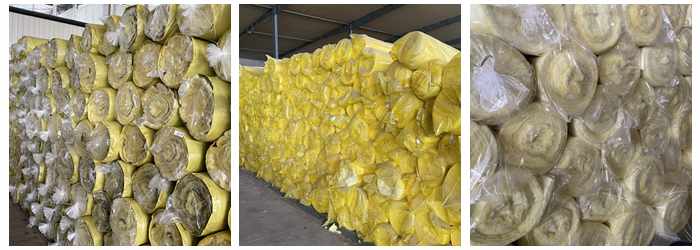Fiber glass wool blanket offers exceptional thermal insulation properties, effectively reducing heat transfer and minimizing energy loss. It creates a barrier that helps maintain comfortable indoor temperatures in both residential and commercial buildings. Additionally, it contributes to sound absorption, reducing noise transmission and enhancing acoustic comfort. Glass wool blanket usually made by centrifugal spraying method. It is characterized by no slag balls, tensile resistance, tear resistance and deformation resistance. It has the advantages of good electrical insulation, heat insulation, heat preservation, non-combustibility, anti-corrosion, anti-mildew and good filtering performance.

| Item | Unit | Index |
| Density | kg/m3 | 10-48 |
| Thickness | mm | 25-200 |
| Length | m | 5-30 |
| Width | m | 0.6-1.25 |
Fiber glass wool blanket insulation has a wide variety of applications for both residential and commercial buildings. It is commonly used for attic insulation where its flexible rolls can be easily laid over floor joists and between rafters. Glass wool conforms readily to attic spaces and provides highly effective thermal insulation. It is also frequently applied as wall cavity insulation. Contractors can install glass wool rolls between wooden or metal wall studs during new construction. As a retrofit measure, insulation can be blown into wall cavities through gaps and cracks.
Glass wool performs well for insulating pipes and ductwork associated with HVAC systems. It helps maintain the temperature of heated or cooled air as it travels throughout the building. The material also insulates chilled water lines and other piping. Glass wool insulation plays an important role in industrial facilities by protecting boilers, tanks, chillers and various equipment from heat gain or loss. It improves energy efficiency of machines and manufacturing processes. The material is commonly used to insulate cold storage and freezer units where consistent sub-zero temperatures must be maintained. Glass wool is also an effective acoustic insulator, reducing transmission of noise in applications like commercial ceiling tiles. Its fire resistant properties make it suitable for applications where safety is critical.
In addition, glass wool blankets also have good seismic properties and can effectively reduce the impact of earthquakes on buildings. Its softness and plasticity make it suitable for surfaces of various shapes and sizes, making it easy to install and construct. In addition, glass wool blankets also have excellent chemical resistance and can resist the erosion of most chemicals and maintain stability under various environmental conditions.
In the context of increasing awareness of energy conservation and environmental protection, glass wool blankets, as a green building material, are widely used in new construction and renovation projects. It can effectively reduce the energy consumption of buildings and have a positive impact on the environment.